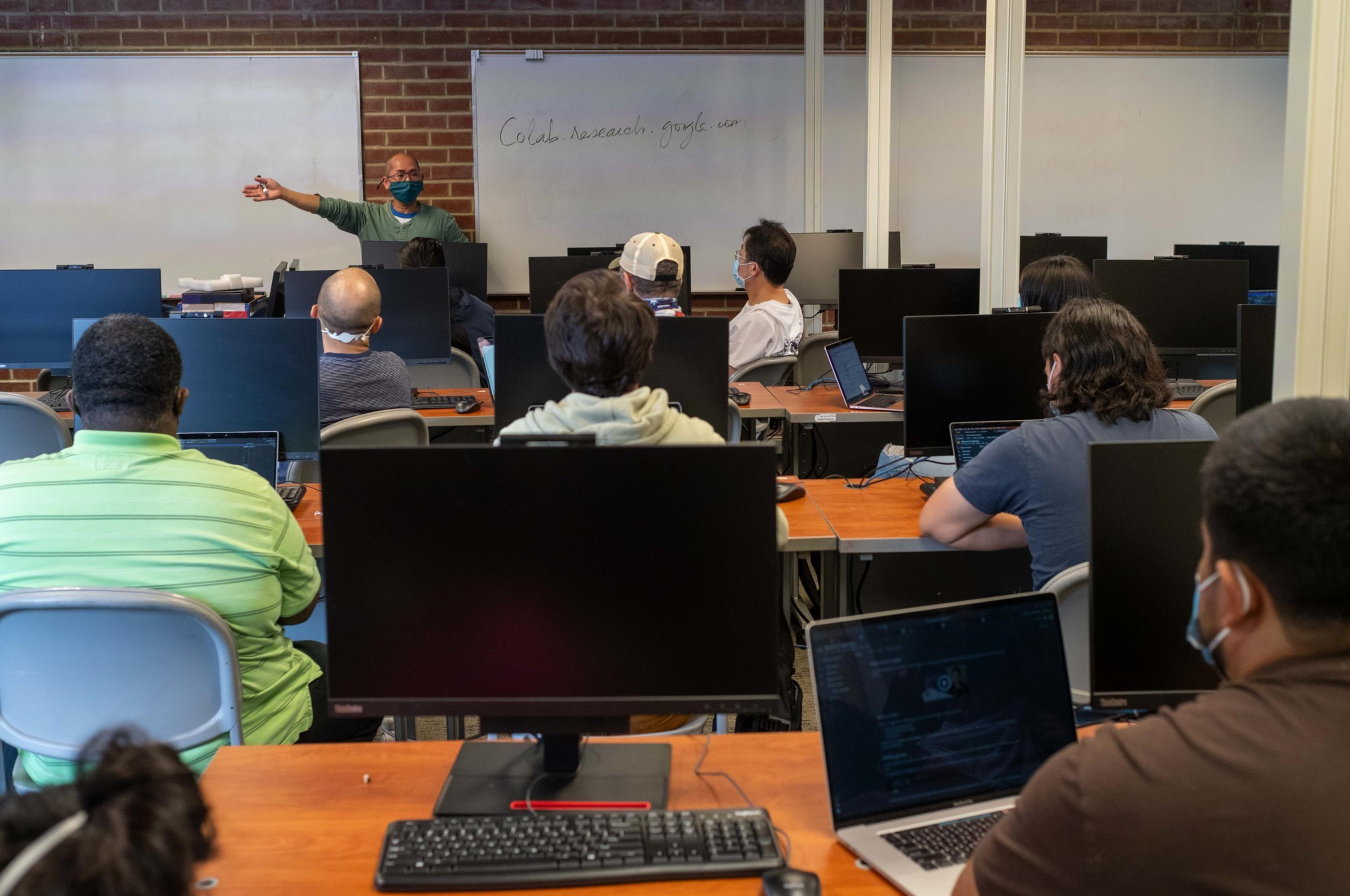With demand for workers in the artificial intelligence field skyrocketing, Bay Area community colleges are looking to train people to fill those roles.
Local community colleges are starting to ramp up AI and machine-learning course offerings so their students can tap good-paying jobs that are on the rise. With AI startups fueling a new tech boom in the Bay Area, they’ll need all the local talent they can get.
The U.S. Bureau of Labor Statistics estimated (opens in new tab) that data scientists will be one of the fastest-growing—and highest-paying—occupations in the coming years. There are nearly half a million open jobs in data analytics, paying a median entry-level salary of $92,000, according to Google (opens in new tab).
To help fill that demand, at least eight local colleges are participating in a regional joint venture to invest in artificial intelligence and data analytics programming through the Bay Area Community College Consortium (opens in new tab). Additional colleges, such as Skyline College in San Bruno, signed up to receive curriculum updates to help create their own.
This helps bring lucrative work opportunities to community college students, who tend to be (opens in new tab) older than four-year university students and from lower-income backgrounds.

It also comes at a time when California community colleges are working to reinvent themselves after several years of declining enrollment (opens in new tab) following the massive shifts that have taken place since the pandemic.
“It’s a way to create more jobs in the industry that are already here, that they can go into, that are high-paying, that don’t require a high degree,” said Ángel Fuentes, dean of workforce development at Evergreen Valley College in San Jose. He added that California community colleges—historically the largest system of higher education in the country—can also help employers tap into a more diverse hiring pool.
Oakland’s Laney College is now offering advanced courses in natural language processing, which is essentially how computers translate language. Under a Peralta Community College District program, which includes Laney and three other East Bay institutions, California residents can take fall classes for free (opens in new tab).
The AI classes offered this fall (opens in new tab) were already full before they began, said Laney instructor Tuan Nguyen, who played a key role in establishing the program. Amazon Web Services, Intel and Google have assisted with the curriculum for company-specific certifications.

“Students are getting excited,” Nguyen said, adding that some students are arriving with ideas about what types of AI careers they want to pursue. “We have the tools, we have the knowledge and students can certainly do it. These skills are a must-have for the next generation of professionals in all areas.”
A year before ChatGPT launched last fall, Las Positas College in Livermore began offering a certificate of achievement in artificial intelligence (opens in new tab). Like Laney, Foothill College in Los Altos Hills also teamed up with Intel as part of its AI for Workforce Program (opens in new tab).
In Santa Clara, a few miles from Intel and other Silicon Valley companies, Mission College is developing a certificate of achievement and an associate of science degree in AI. Clement Lam, the college’s dean for math, science and engineering, hopes to have the program in place next fall.
Community colleges in the Bay Area that aren’t in the consortium don’t plan to be left behind. City College of San Francisco, for example, offers a six-week non-credit workshop on artificial intelligence (opens in new tab).

Community college students can access entry-level and middle-skill positions (opens in new tab) as analysts in cybersecurity, autonomous vehicle planning, finance and operations. Even for those who aren’t interested in learning AI skills, an array of growing support industries will also need more workers. For example, electricians and building trades are in high demand to manage related infrastructure such as data centers, said Ray Kaupp, who worked for the community college consortium until recently.
Students in the Bay Area have a distinct advantage due to their proximity to the industry, but there is competition. Colleges across the country are racing to invest in AI programs (opens in new tab), making it increasingly difficult to attract and keep qualified faculty amid the gold rush, said Glenda Morgan, an education tech analyst with Phil Hill and Associates.
“We’re seeing a mad dash toward AI, both in terms of people trying to use it and schools trying to teach people,” Morgan said.
